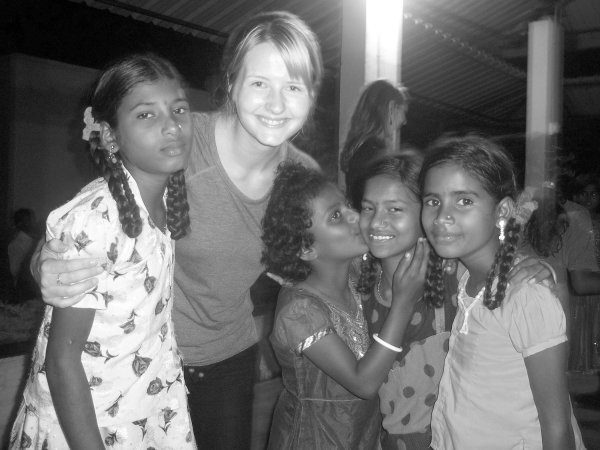Tales from Abroad is an ongoing section in which Gustavus students share the highlights of their study abroad experiences.
My name is Jennessa Runia and I’m a Mormon. JK. My name is Jennessa Runia and I am a senior student at Gustavus Adolphus College. I am a Biology major and double minor in Peace Studies and Sociology/Anthropology. I am currently studying abroad in India on the Gustavus sponsored Social Justice, Peace, and Development course.
This program is centrally located in Bangalore, India at a non-governmental organization called Visthar. Throughout the semester our group has travelled around India to various cities for weeks at a time. This course is in collaboration with Concordia and this year there are six Concordia students, five Gustavus students, one Concordia professor, and one leader from the Visthar campus.
The general layout of the course is four courses each over a three week period. The four courses are: Religion, Culture and Society; Identity, Resistance, and Liberation; Environment, Ecology, and Livelihood; Globalization and Development. These are just the technicalities of our program, but it is much more than that.
Since my freshman year I had troubles deciding what study abroad program to choose, but now after a month into my program I know I made the right choice. I have experienced the culture of India in so many different ways, from only eating with your right hand and no utensils to the large amounts of traffic, honking, speed bumps, and other road mayhem.
India is an amazing, growing, beautiful, and lively country. Currently, the area is very green and the Visthar campus is very tropical with various plants and even a coconut tree grove!
All of that aside, I am broadening my perspectives about so many social justice topics and using experiential and classroom settings to explore these views. So far we have discussed how institutionalized religion plays a role in everyone’s lives even if one identifies as atheist. Within this discussion we have studied Hinduism, Christianity, Islam, and Sikhism in India. We have also explored the concepts of faith and spirituality and how those differ from religion.
The most recent ideas discussed are about what identities make up an individual and how that affects their lives. There are so many oppressions that come out of one single identity, and yet all identities are intricately intertwined. We have discussed white privilege, racism, feminism, transgender, other genders, poverty, disability injustices, etc. and this is only the first month. Many of these topics can be discussed in the United States, but some aspects make more of an impact in a different country.
I have two examples of this, the first being visiting a wig factory. There, I saw there are laborers working in poor conditions, making consumer products for upper-class people/ This did not impact me directly until seeing this on a field visit.
The second being how different identities affect us in different cultures, such as a person who is a women, working-class, Dalit caste within India. In this second example, this person also has the added oppression of the caste system, which is something I would most likely not encounter in my American studies.
In America being a working-class woman may be acceptable, but this identity may face different stigmatizations within other cultures. My experience abroad in India thus far has been truly transformative. Although I am sure what I have told you about my experience in India has influenced you, I don’t want to paint a single picture in your mind about what India is, so come experience it for yourself.
-Jennessa Runia
